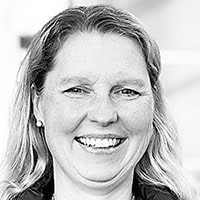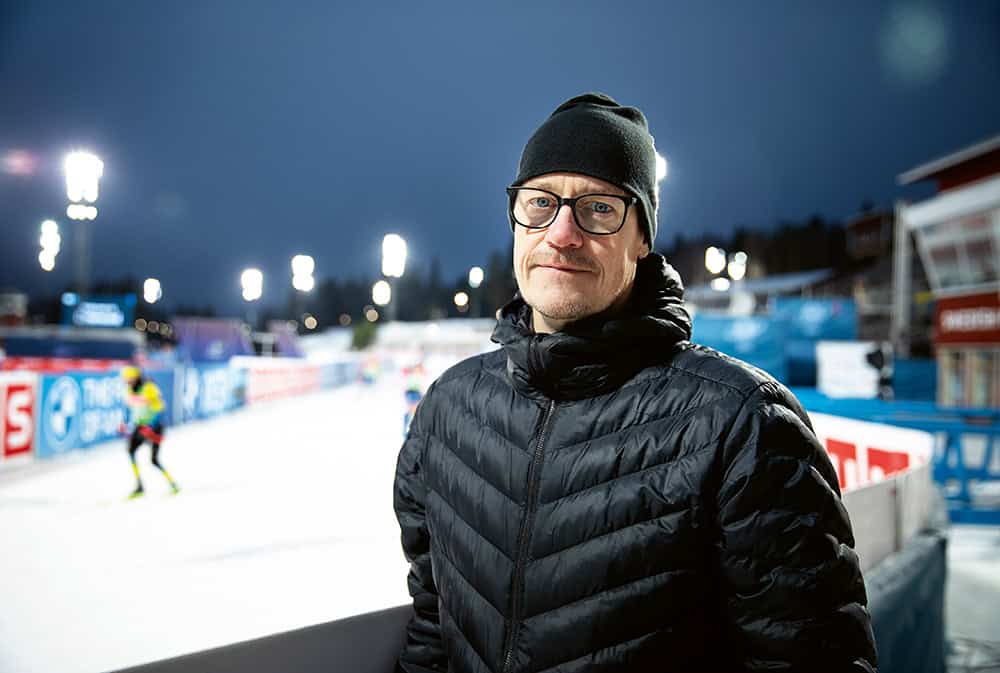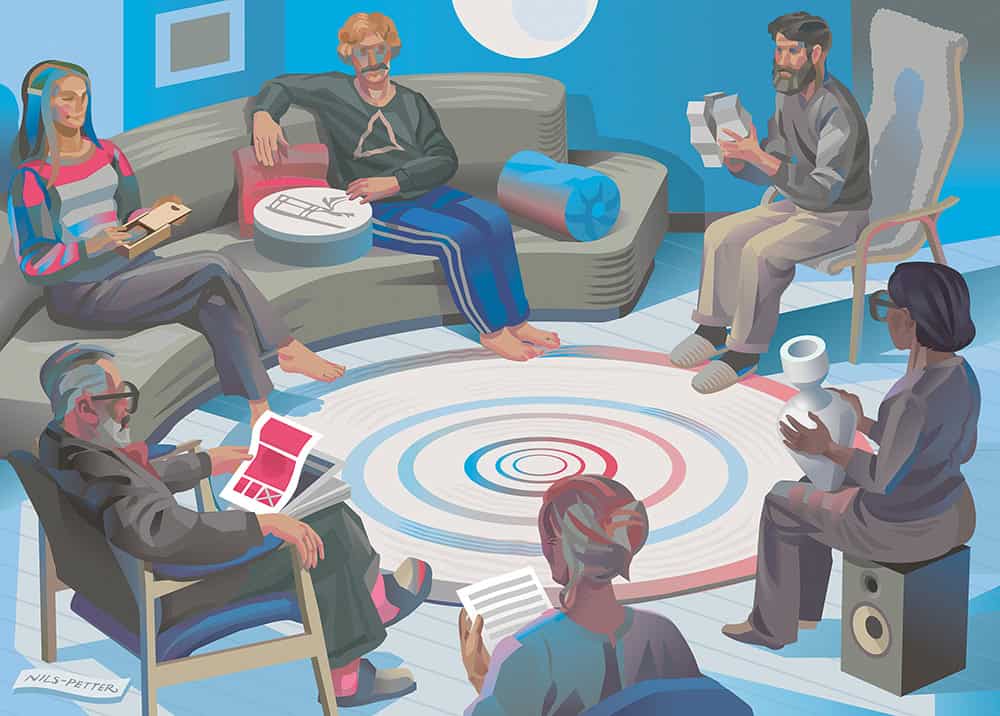When Anna Elmquist was in secondary school, in the nineties, she did practical work experience at Huddinge police station, including at krimjour, a type of on-call crime investigation unit. A robbery took place during her placement there. The investigators struggled to get a licence plate number for the getaway car from several witnesses.
“I have always liked brain teasers, so I sat down and started to put together these different pieces that we had and presented what I came up with to the investigators.”

Anna Elmquist
Doctoral student in police science
When she presented her ideas, she was encouraged to apply for the police education programme when she left school. And so she did. She studied at the Police Academy in Stockholm and then did a stint as a trainee officer in southern Sweden.
After a few years in Eslöv and Malmö, mainly on patrol, Elmquist returned to Stockholm. She has always had her sights set on working with investigations, and that is what she has worked with in different ways. At the krimjour unit, with investigations of offences against children and even at the Swedish Economic Crime Authority for a period.
“They had very good training programmes there back then,” she says.
She has always had a desire to educate herself and learn more, and she studied in parallel with work for much of her career in the police. Above all psychology, but also law and police work.
In her final few years within the Police Authority, she worked with financial crime and fraud. She found it exciting and stimulating.
“But there was a large influx of cases.”
When she attended the police’s own training programme to become an investigating officer, she was asked to start teaching herself.
“It didn’t really work for me to do that at the time. And meanwhile, I had heard that Södertörn University was about to get the police education programme.”
She applied for a position as a police teacher there instead, and for ten years she has taught criminal investigation law, psychology, interrogation techniques and police work.
“This is a learning and dynamic organisation. I loved working as a police officer, but I found my home here at the university.”
She thinks that the police often have too little time for reflection. When you might need to evaluate something, you are already on your way to solving your next task. She also sees this as a possible explanation for why it is so difficult to implement research at the Police Authority.
“As police officers, we write a lot. We take notes and report. But we are not good at reflecting and evaluating.”
Elmquist compares the work of the police with healthcare. In a hospital, you would never be satisfied with ‘bringing in more people’ or ‘testing a few things that have worked before’. She says that in that environment, nothing is done without empirical evidence and practical experience. What she misses about policing, however, is the collectivist spirit. She still says ”we” when she talks about her old employer.
“In academia, there is a tendency to look after your own interests, and that can sometimes feel egotistical. I come from a culture where people always support each other in the collective.”
As a police teacher on the police education programme, you are still employed by the Swedish Police Authority. But in June, Elmquist resigned from the authority.
Her research position is funded by the School of Police Studies at Södertörn University, but the doctoral programme is attached to Umeå University, which is still the only university authorised to conduct doctoral studies in police science.
“It is a privilege to be part of these two research environments,” she says.
If she had been given the choice, she would have liked to continue to be employed by the Police Authority part-time and keep one foot in the field. But the alternative she was offered was a full-time position.
“I think it would have been smarter to use my skills in a different way. But I am not closing any doors.”
Anna Elmquist is not alone in her desire as both a researcher and a police officer to keep one foot in the Police Authority. In a study from Linnaeus University looking at academisation processes in police education and the police organisation, 20 police officers with doctorates were interviewed about how they would view the opportunity to use their research skills at the Police Authority.
The study shows that most of the police officers with doctorates have left the Police Authority. They explain that they would have liked to work in ‘both worlds’, but they were forced to leave the police when the organisation did not provide space for their expertise. The article also describes how they perceive little or no interest in research from the police leadership.
Elmquist does not believe that the Police Authority is generally uninterested in research, but that there is an element of culture clash.
“’Things move quickly in the police, but lead times are long in research. And they have completely different traditions.”
Despite leaving the Police Authority, she hopes to help build bridges between the police and the research community. And she emphasises that she wants to devote herself to research that will benefit the work of the police. She firmly believes that the research must be closely linked to the profession.
“I want to look at how we can improve the way we investigate. What works and why? What knowledge is important to be able to conduct qualitative investigations, at both individual and organisational level?”
She talks about revitalising the crime investigation system and returns several times to the importance of good criminal detective work, of identifying success factors and preserving what works.
“If you do that, you will be less inclined to break up organisations that are actually working well. You can protect the core features. That is really the essence of what I want to do: to create tools so that managers in investigative functions can point to what works in order to continue.”
The Police Authority would have a lot to gain from a renaissance in criminal investigation. The investigative profession, with the exception of serious crime investigators, has declined in status in recent decades. There are several explanations for this. Generational turnover and reorganisations have resulted in the loss of a lot of experience and expertise. In a culture where much of the knowledge is passed on from police officer to police officer, that has significant impact.
It has been most difficult on the everyday crime side. Here, the cases pile up on the police officers’ desks. Elmquist wonders what it does to the social contract when crimes such as theft and fraud, which can ruin people’s lives, are not perceived by the public as being prioritised. She is also concerned that everyday, common offences are not investigated even though it is well known that they are often linked to serious organised crime.
In order to use police science to improve police work, she sees great advantages in being a researcher with a background in the police. When she wrote her master’s thesis in police work, she interviewed investigators in Stockholm County. She asked ”what is the first thing you think about when you get a case?”. It was a question her examiner found difficult to understand. But for her as a police officer, the answers provided a lot of information, as she knows that that first thought can be of great importance for how investigators proceed with the case.
“For example, many of them had ‘a colleague’ whose first thought was to wonder whether the case could be closed.”
How does it feel to break new ground and be the first person to do a doctorate in a new subject?
“I really feel like ‘finally!’. It is fantastic. The epithet of being the first also means that it could attract a lot of attention. But I really want to thank the police officers who have gone before me and completed doctorates in other research fields. Those who paved the way.”



















